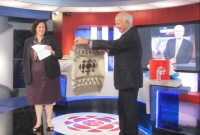Nova Scotia premier says miniseries about Canada must be corrected

The premier of Nova Scotia has added his voice to a growing chorus of complaints about a TV docu-drama about Canada's history.
Stephen McNeil said the CBC program, "Canada: The Story of Us," was wrong to assert that the country's first permanent European settlement was established in 1608 near what is now Quebec City.
The premier said the history of Canada started three years earlier, when French explorer Samuel de Champlain founded a settlement at Port Royal, N.S., now a national historic site in his riding.
"The history of Canada started in 1605 in Port Royal when (Mi'kmaq Grand Chief Henri) Membertou welcomed Champlain here in peace and friendship," the premier said Thursday after making an announcement in Fall River, N.S.
"It is unfortunate that people will try to rewrite history. The fact of the matter is that Canada was founded here. Multicultural Canada began here in Port Royal."
The premier said Canada's public broadcaster should correct the mistake.
Also Thursday, Nova Scotia's Acadian federation issued a statement saying the first episode of the series misrepresented Canadian history. The advocacy group echoed the premier's complaint, saying the first permanent European settlement was indeed at Port Royal, "contrary to what was stated in the television series."
"The history of our country does not begin in 1608," said federation president Ghislain Boudreau. "This omission in the CBC's television series gives a misrepresentation of our Canadian history and dismisses the fundamental contribution of the Acadians in the creation of this country."
A spokesman for CBC has said the two-hour show focused on Quebec City area because, unlike Port Royal, it has maintained a permanent population without interruption from 1608 onward.
"It's also important to note that this series features key moments in Canadian history," Chuck Thompson said in a statement Wednesday. "It is not meant to be a comprehensive and linear account of our nation's history."
Peter Riding, a history professor at the University of Ottawa, said he understands the need to keep storylines clean to maintain viewer interest, but any treatment of Canadian history should begin in 1604-05.
"The CBC program seems to smack of a central Canadian perspective that all too often overlooks events that occurred outside the St. Lawrence-Great Lakes region," he said in an email.
"Of course, the Norse and Basques appeared (even) earlier, and a European presence on the Atlantic coast goes back to around AD 1000. Some current archaeological research on the early evidence of the Norse is pushing that date even further back."
According to the Canadian Encyclopedia, Port Royal was established near the mouth of the Annapolis River by Champlain and Pierre du Gua de Monts in the summer of 1605, but the site was abandoned in the summer of 1607. The colony was re-established by an original colonist in 1610 and changed hands several times after that.
However, the encyclopedia's online version specifically states: "Port Royal remained the earliest European settlement of any permanence in North America north of St. Augustine, Florida."
The Parks Canada website describes the reconstructed historic site as "one of the earliest European attempts at settlement in North America."
But Nova Scotians aren't the only ones complaining about the episode.
Earlier this week, New Brunswick's Green party leader, David Coon, wrote in an editorial that before Champlain settled Port Royal in 1605, he "built the first Euopean settlement in 1604 on St. Croix Island, just off the shore from present-day Bayside, N.B., marking the birth of L'Acadie."
The island is now on the American side of the Canada-U.S. border.
Coon's piece goes on to explain that Champlain's group left the island after one disastrous winter, sailing on to Port Royal the following summer.
"Has the position of New Brunswick, L'Acadie and the Maritimes diminished in the national psyche to the point that our history is being erased by the CBC?" Coon wrote. "If New Brunswick's place in Confederation is invisible, then it becomes impossible to rally national support for equitable treatment of or province by Ottawa."
The debate over the accuracy of the program, broadcast Sunday night, received national attention Wednesday when the mayor of Annapolis Royal, N.S., denounced the show as a disrespectful and erroneous version of what really happened when Europeans first settled in Canada.
Mayor Bill MacDonald said he was particularly miffed by the fact that Port Royal, which is near Annapolis Royal, wasn't mentioned during the show.
"To suggest that this wasn't the beginning of Canada — the cradle of Canada — simply because the doors may have been closed for a couple of years ... really doesn't appreciate the context in which history unfolded," MacDonald said.




Comments